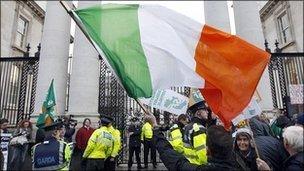Ireland: a year of financial turmoil
- Published

The deal with the European Union and the International Monetary Fund has led to protests
Few would have predicted in January that by December the International Monetary Fund (IMF) would have such a huge ongoing say in how the Republic handles its finances.
To mix animal metaphors, 2010 was the year the financial chickens, associated with the Celtic Tiger boom years, came home to roost.
It's true that people here knew things were bad; after all the government had taken 14.5bn euro (£12.3bn) out of the economy since October 2008, but the speed with which events developed following "Black Thursday", on 30 September, was truly breathtaking.
That was the day the government said it believed the final cost to the tax-payer of the property-developers' favoured but failed bank, Anglo-Irish, would be close to 35bn euro (£29.8bn) and the eventual cost of all the banks and building societies could be as high as 50bn euro (£42.5bn).
To give those figures some context, the annual tax take in the Republic is around 31bn euro (£26.4bn).
The figures shocked the public because over the past two years ordinary people had been told the cost to the state of Anglo-Irish bank would be nothing, then 4bn euro (£3.4bn), later 12bn euro (£10.2bn), then 18bn euro (£15.3bn), later 24bn euro (£20.4bn) before finally reaching 35bn euro (£29.8bn).
And if that wasn't enough some economists think the ultimate cost will be a lot higher.
Unsustainable levels
It didn't take long for the financial markets to react.
Very soon the cost of Irish borrowing began to rise dramatically to unsustainable levels.
The Taoiseach, Brian Cowen, and his Finance minister, Brian Lenihan, insisted the country didn't need a bail-out loan and that despite international media reports, the Fianna Fail - Green coalition government wasn't looking for European or IMF help to deal with either the banking problem or the problem of its own finances.
Europe, worried about the future of the euro as a currency and fearing possible contagion of high borrowing costs spreading from Ireland, saw matters very differently.
When the truth dawned on Sunday 28 November that there would be an 85bn euro (£72.3bn) bail-out with an annual interest payment average of 5.8% many people felt lied to; others believed the government had negotiated a bad deal.
The loss of economic sovereignty prompted one newspaper editorial to wonder whether it was for this that the men of the 1916 Easter rising had died.
Such was the reaction that within 24 hours the Greens announced they would pull out of government once the budget and associated financial measures had passed the Dail.
That means there will now be a general election early in 2011.
Research suggests that Enda Kenny's Fine Gael is likely to be in government with Eamon Gilmore's Labour.
One poll had Fianna Fail, which got 40% of the vote in the last election, down to 13% and behind Sinn Fein in 4th place.
Changed times, indeed!
Brian Cowen, whose personal rating at one stage dropped to 8%, seems set to lead Fianna Fail into the 2011 poll and to almost certain electoral defeat.
Changed political landscape
Gerry Adams' decision to resign as an MP and MLA in order to run for the Dail in the Louth constituency and Pearse Doherty's victory in the Donegal South West by-election are likely to boost the Sinn Fein vote in next year's election.
So, we can expect a much changed political landscape in 2011.
But some old problems will remain.
Both Fine Gael and Labour are committed to getting the Republic's budget deficit down from its current level of 32%, inflated due to the one-off cost of the bank bail-out, to 3% by 2015 in line with the rules of the eurozone and agreements reached by Dublin with its European partners and the IMF.
That will require further spending cuts and tax rises.
In the December budget, the government took 6bn euro (£5.1bn) out of the economy; a further 9bn euro (£7.7bn) will come out over the following three to four years.
The opposition parties accept the broad thrust of what the Fianna Fail - Green coalition is trying to do, but differ on some of the detail.
Indeed, during the forthcoming election, Brian Cowen will be keen to highlight the differences between the parties of the likely alternative coalition.
No matter who wins the election one thing is clear, the Republic faces years of austerity and the government will have little time to devote to other issues like Northern Ireland.
The past year has shown that it's not always wise to make predictions, but I'll make one: if Brian Cowen leads Fianna Fail to another election victory in 2011, it will be the greatest comeback since Lazarus.